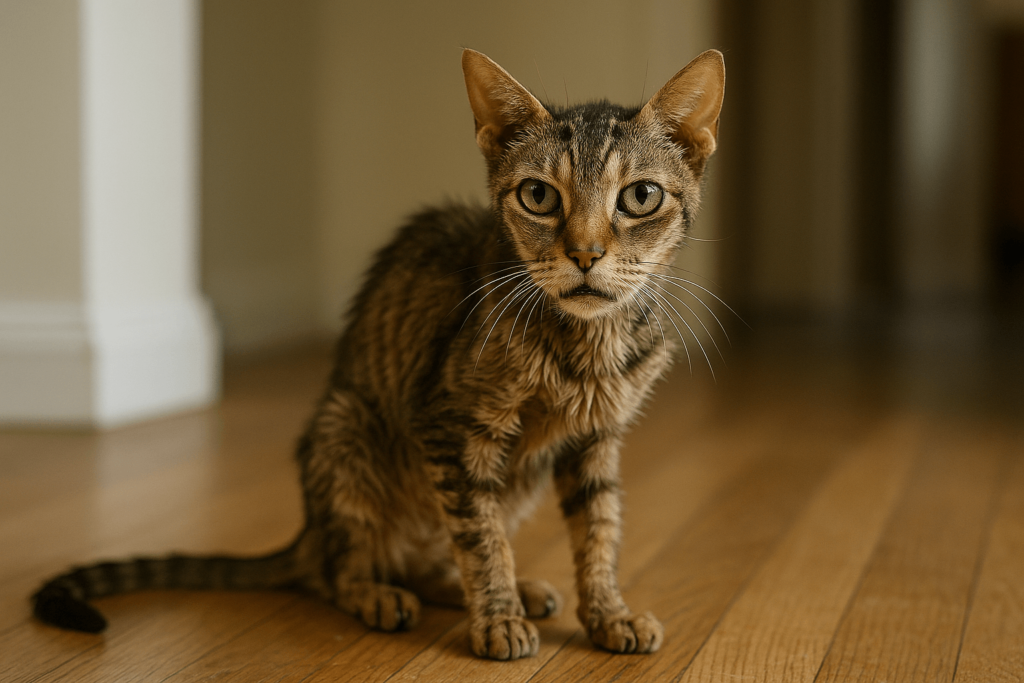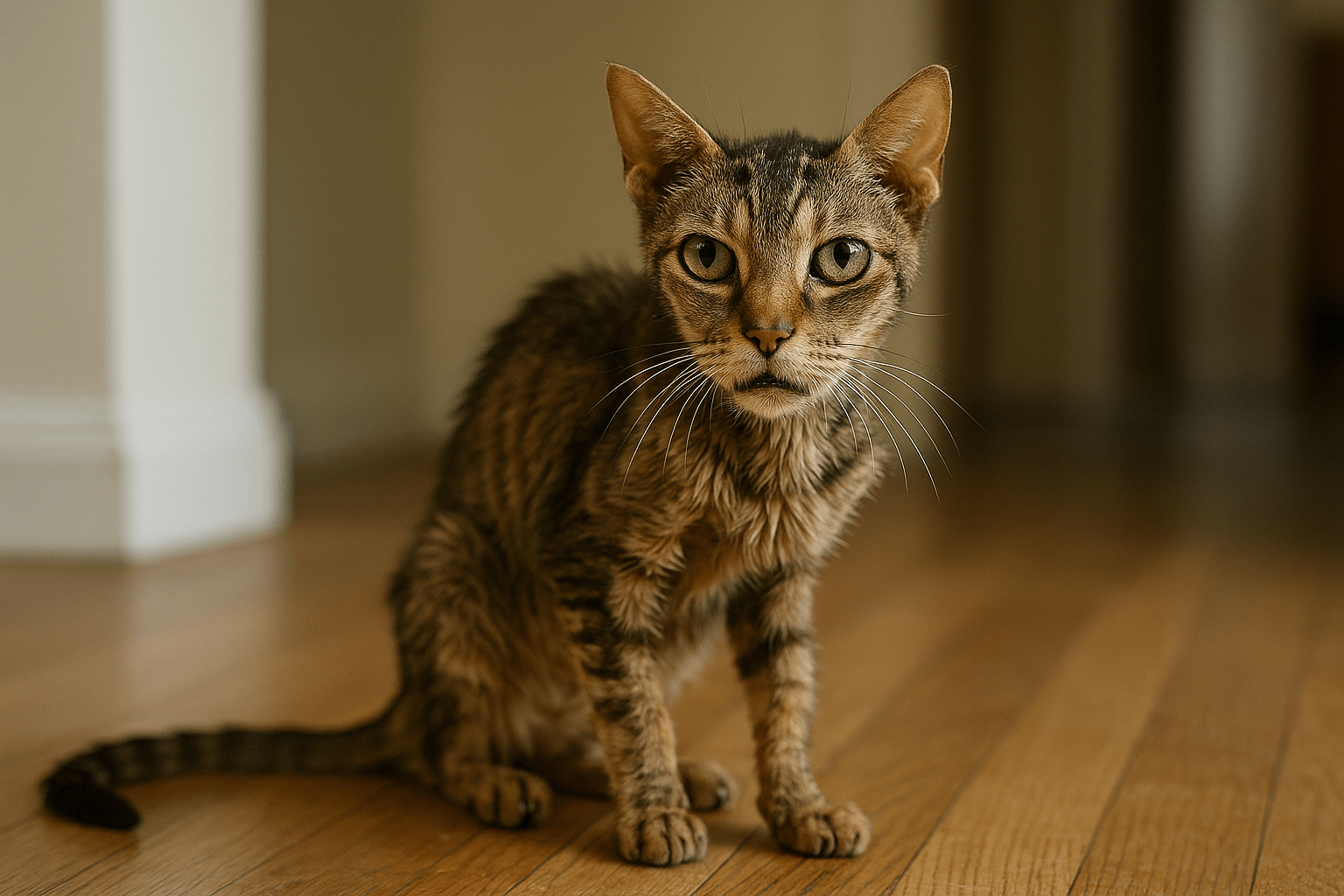Cat Hyperthyroidism Symptoms: The Quiet Cry Your Feline Can’t Speak
Cat hyperthyroidism is one of the most common endocrine disorders in older cats—yet its early signs are often mistaken for normal aging. A cat that’s suddenly more energetic but losing weight? That’s not “just getting skinny.” A cat drinking more water and peeing everywhere? Not “being messy.” These aren’t quirks—they’re symptoms. Left undiagnosed, hyperthyroidism can lead to heart failure, kidney damage, and even death. Recognizing the subtle, sometimes contradictory signs is the first step toward saving your cat’s life.
Why Hyperthyroidism Is More Than Just “Acting Young”
Hyperthyroidism occurs when the thyroid glands produce too much thyroid hormone—T4—speeding up your cat’s metabolism like a car stuck in overdrive. This isn’t excitement; it’s systemic chaos. Here’s what’s really happening beneath the surface:
Weight Loss Despite Increased Appetite:
Your cat may eat twice as much but still drop pounds—this paradox is one of the most classic and telling signs.Restlessness and Hyperactivity:
They might pace, meow excessively, or seem unable to settle—even at night. This isn’t playful energy; it’s nervous system overstimulation.Increased Thirst and Urination:
Excess thyroid hormone forces the kidneys to work harder, leading to frequent, large volumes of urine and constant water-seeking.Poor Coat Condition:
Fur may become dull, greasy, or matted—not from lack of grooming, but because the body is too metabolically taxed to maintain it.Vomiting or Diarrhea:
Gastrointestinal upset is common as the digestive tract speeds up, reducing nutrient absorption and triggering nausea.
These aren’t random behaviors. They’re biological alarms. Ignoring them because “she’s still playful” could cost you precious time—and your cat’s health.

The Hidden Symptoms You Might Miss
Not all signs of hyperthyroidism are loud. Some are quiet, gradual, and easily dismissed. These are the red flags that sneak up on even the most attentive owners:
Lethargy in Some Cats:
While many cats become hyperactive, others grow unusually tired, withdrawn, or weak—especially in advanced cases or if heart disease develops.Heat Intolerance:
Your cat may avoid sunny spots, lie on cool tiles, or pant in warm rooms—unusual behaviors for a normally heat-seeking animal.Changes in Behavior or Personality:
A once-affectionate cat becomes distant. A calm cat starts growling or hiding. These shifts signal neurological or metabolic stress.Difficulty Jumping or Climbing:
Muscle wasting from prolonged hypermetabolism can make even familiar heights feel impossible.Bad Breath or Oral Discomfort:
Thyroid hormone imbalance can worsen dental disease, leading to foul odor, drooling, or refusal to eat hard food.
These subtle signs often go unnoticed until the disease is severe. That’s why regular senior cat checkups aren’t optional—they’re lifesaving.
Check this guide 👉Traumatized Cat Symptoms: Best 7 Expert Tips!
Check this guide 👉Cat Heart Disease Symptoms: Best 7 Expert Tips!
Check this guide 👉Deadly Cat Diseases and Symptoms: Best 7 Expert Tips!
| Common Symptom | Why It Happens |
|---|---|
| Unexplained weight loss | Excess thyroid hormone burns calories faster than intake can replace them. |
| Increased appetite | Metabolism accelerates, triggering constant hunger signals to the brain. |
| Excessive thirst and urination | Thyroid hormone increases kidney filtration rate, leading to dilute urine and dehydration. |
| Vomiting or diarrhea | Gastrointestinal motility increases, reducing digestion time and nutrient absorption. |
| Dull, unkempt coat | Body prioritizes vital functions over grooming; protein and energy are diverted away from skin and fur. |
How Hyperthyroidism Affects Other Organs
Hyperthyroidism doesn’t stay in the thyroid. It sends shockwaves through the entire body. The heart, kidneys, liver, and nervous system all bear the brunt.
Heart Strain:
Excess thyroid hormone causes the heart to beat faster and harder, leading to hypertrophic cardiomyopathy—a thickening of the heart muscle that can cause sudden death.Kidney Stress:
While hyperthyroidism can mask early kidney disease by increasing blood flow to the kidneys, treating the thyroid may reveal underlying renal failure.Liver Overload:
The liver works overtime to process excess hormones and metabolites, sometimes leading to elevated liver enzymes and jaundice.Muscle Wasting:
Constant energy burn breaks down muscle tissue—especially in the hind legs—making your cat appear frail or uncoordinated.Nervous System Overdrive:
Tremors, irritability, and even seizures can occur as neurotransmitter activity becomes unbalanced.
This is why treating hyperthyroidism isn’t just about fixing one gland—it’s about protecting your cat’s entire internal ecosystem.
When to Suspect Hyperthyroidism (Even If Your Cat Seems Fine)
You don’t need every symptom to suspect hyperthyroidism. Often, just two or three clues are enough. Be vigilant if your senior cat (age 10+) shows:
A sudden change in eating habits — especially eating more but losing weight.
A noticeable drop in grooming — fur that looks greasy or tangled despite no change in routine.
Increased vocalization at night — yowling, pacing, or restlessness when they used to sleep soundly.
A rapid heartbeat or panting — something you might feel if you pet them or notice during vet visits.
A history of vague “old age” symptoms — like intermittent vomiting, diarrhea, or lethargy that never fully resolved.
Don’t wait for the classic triad (weight loss, increased appetite, hyperactivity). Many cats present with atypical or mild signs. Early detection is the difference between manageable treatment and emergency crisis.
Diagnosis: What Your Vet Will Look For
If hyperthyroidism is suspected, your vet won’t guess—they’ll test. Here’s what’s involved:
Blood Test for T4 Levels:
The primary diagnostic tool. Elevated T4 confirms hyperthyroidism in most cases.Complete Blood Count (CBC) and Biochemistry Panel:
Checks for secondary issues like liver enzyme spikes, anemia, or kidney dysfunction.Urinalysis:
Evaluates kidney concentration ability and checks for infection or dilution caused by excess hormone.Blood Pressure Measurement:
Hypertension is common in hyperthyroid cats and can damage eyes, brain, and kidneys.Thyroid Scan (if needed):
Used to determine if one or both glands are overactive and to rule out thyroid cancer.
Even if your cat seems “fine,” annual senior wellness panels are non-negotiable. A simple blood draw can catch this disease before it steals your cat’s life.
Treatment Options: What Works Best for Your Cat
Hyperthyroidism is treatable—but not curable without intervention. Here are the four main options, each with pros and cons:
Medication (Methimazole):
Daily pills or transdermal gel that suppress hormone production. Affordable, non-invasive, but requires lifelong use and monitoring.Radioactive Iodine Therapy (I-131):
A single injection that destroys overactive thyroid tissue. Curative in 95%+ of cases, but requires hospitalization and isolation for 1–2 weeks.Surgical Removal (Thyroidectomy):
Removes the affected gland(s). Effective but carries anesthesia risks and potential damage to nearby parathyroid glands.Prescription Diet (Hill’s y/d):
A low-iodine diet that starves the thyroid of its building block. Only works if your cat eats nothing else—no treats, no other food.
The best choice depends on your cat’s age, kidney health, your budget, and your lifestyle. Talk to your vet about what fits your cat’s unique needs—not just your convenience.
What Happens If You Don’t Treat It?
Ignoring hyperthyroidism isn’t an act of love—it’s a slow betrayal. Left untreated, your cat will:
Lose muscle mass until they’re skin and bone — even if they’re eating constantly.
Develop irreversible heart damage — leading to congestive heart failure or sudden collapse.
Experience kidney failure — masked at first, then revealed once thyroid levels are lowered.
Suffer from hypertension-induced blindness — retinal detachment from high blood pressure.
Eventually die from multi-organ failure — often after months of slow, silent decline.
This isn’t fearmongering. It’s medicine. Hyperthyroidism kills slowly—but it doesn’t have to.
FAQ: Cat Hyperthyroidism Symptoms
Can a young cat get hyperthyroidism?
Rarely. It’s almost exclusively a disease of cats over 10 years old. If a younger cat shows symptoms, other conditions like cancer or liver disease must be ruled out.
Is hyperthyroidism contagious?
No. It’s a hormonal disorder caused by benign tumors in the thyroid gland—not an infection or virus.
Can diet cause hyperthyroidism?
Not directly, but some studies suggest high iodine levels in certain commercial foods may contribute. Avoid fish-heavy diets if your cat is at risk.
Will my cat’s weight return after treatment?
Usually, yes. Once hormone levels normalize, metabolism slows, appetite returns to normal, and healthy weight is regained over weeks to months.
How long can a cat live with hyperthyroidism?
With proper treatment, most cats live 3–5+ years after diagnosis—some even longer. Untreated, survival is often less than a year.
Trust the Signs—Even the Quiet Ones
A cat with hyperthyroidism doesn’t scream for help. They don’t cry. They don’t beg. They just… change. They eat more but grow thinner. They purr louder at night but sleep less. They stop grooming—not because they’re lazy, but because their body has no energy left to spare.
Canned Pumpkin for Cat Diarrhea: Best 7 Expert Tips! Natural remedy to firm stools, soothe upset bellies, and support gut health safely.
Can a Cat Give You Scabies? Best 7 Expert Tips! Discover the truth about feline mites, human skin risks, and how to protect yourself—without panic.
Cat Flea vs Human Flea: Best 7 Expert Tips! Discover the truth about bites, species, and how to eliminate infestations for good.
Weird Cat Behaviors: Best 7 Expert Tips! Discover why cats do strange things—and how to understand, not punish, their instincts for a happier home.





